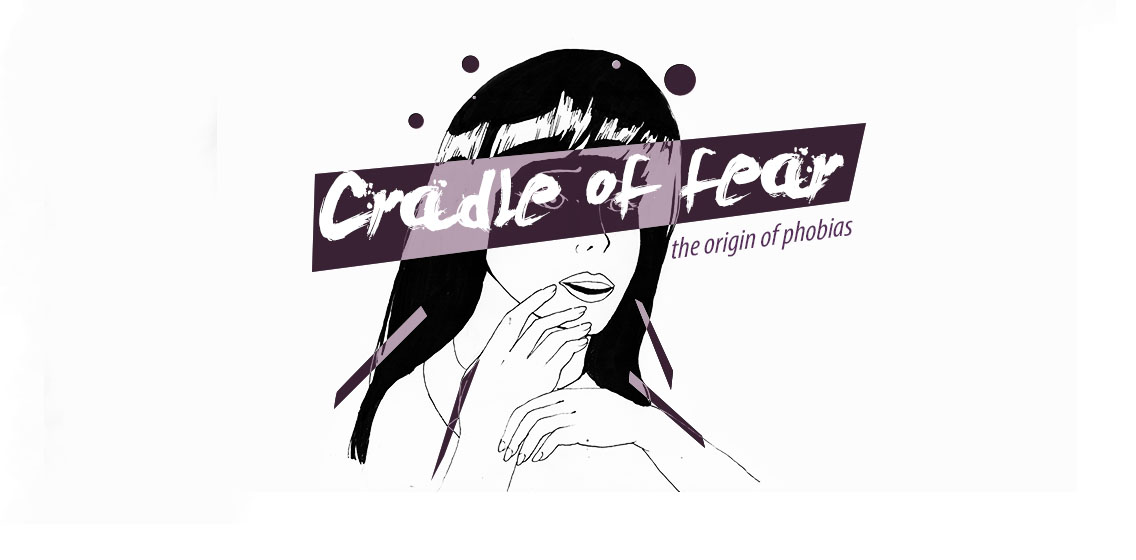Cradle of fear: The origin of phobias
From stammering in front of a massive crowd to fear of heartbreak or failure, anxiety preoccupies each person—even those with the bravest souls. Although it is true that experiencing fear helps us be aware of the dangers of our environment, it should be experienced in moderation. However, some of us could be too anxious toward something that it eventually becomes a phobia. The thing is, phobias are starting to get more and more peculiar that Ablutophobia (fear of taking baths) and Trypophobia (fear of holes) actually exist. Now let’s take a quick connect-the-dots session about our fears, before our phobias crush us in its immobilizing clasp.

With just a footstep to the outside world and a surge of threats like terrorism, kidnappings, and wars causing too much casualties will bombard us with the reality that we live in an age where danger is embraced as its mortifying main character. With the state of the world that cultivates widespread alarm, it’s no surprise that small things become as frightening as the horrific sources it reminds people of (i.e. Chinese bagua and pellet guns). All of which may prove one thing: nothing is without a hint of fright anymore.
Although nurture trumps nature when it comes to our mental development, we already knew what to dread the moment we started developing inside our mother’s body. This phenomenon happens as the fetus can acquire its mother’s fears through an odor the mother emitted that’s absorbed by the child, according to a study led by University of Michigan Medical School Psychiatry professor, Jacek Debiec. So don’t be surprised when you and your mom start simultaneously turning pale at the sight of gushing blood, as it may just be another addition to your inheritance.
Outside our biology, we can still absorb fear through instructional fear acquisition. As its name suggests, it is convincing ourselves of something scary through truth-like or deceitful information according to The Atlantic. It’s as simple as being repulsed by playing old videotapes after watching Sadako crawl outside the TV in The Ring. Not that you should go around pointing fingers, but continuously witnessing headache-inducing quarrels from your parents or being exposed to films, books, or even retweets of the “Walang Forever” theme may very well put you off relationship commitment.
One’s crippling anxiety toward something can also be induced by witnessing crucially disturbing events like murder or rape—even if you witness it from afar. Psych Central says that people might have contracted phobias from childhood as children are the most susceptible to mental distress. Small fragments that remind them of an upsetting incident that scarred them for life may easily shatter their sense of safety.
Polish poet Stanislaw Jerzy Lec once said, “You can close your eyes to reality but not to memories.” Our eyes offer no filters—allowing even the most detestable memory to stand under the limelight of repugnant recalls, even beyond our anchored will.

Being insurance-crazy, installing multiple locks in your house, and carrying an illegal stun gun to make yourself feel safer in your daily commuting spree can be more of a behavioral dilemma than a means of self-defense. For some, the only way to stay safe and sane in this big, bad world is to voluntarily lock themselves inside their homes with TV as their only companion. But the joke is on them as television hides its true identity behind an entertaining facade.
Apart from the alarm we receive all thanks to the crime-busting real time dramas of our local TV stations, we’re similarly exposed to shows generous enough to be considered noxious—news. Given the abundance of bad over good in news networks, The Guardian articulates that bad news to the mind is similar to what sugar is to the body. Frankly, bad news may even be toxic to some of us—but not usually. Other than fear and aggression, unnerving news stories might decontrol the immune system, impair digestion, and obstruct physiological growth when our body finds itself in a state of chronic stress, as stated by Swiss philosopher Ralf Dobelli.
Though crime in the Philippines did intensify in 2015 as stated by the Philippine National Police, we ought to reason from watching Scene of the Crime Operatives, Imbestigador, or any Tulfo shows where the good guys typically takes down the bad, that we are completely safe. But the truth says otherwise, as the more one watches other TV crime shows, the higher their chances of developing irrational distress. This can include unreasonable fear of identity theft, being stalked, or terrorist attacks, according to a study in Chapman University, US.
Some believe that this illogical distress for people’s dark plans may be connected to the dangerously increasing violence in the media. In our country, violence is the heartbeat of almost every Filipino film. Even back in the reigning years of Dolphy and Fernando Poe Jr., brutality was (and still is) cast off as gags and an easy token for a most-awaited revenge by means of the standard kidnappings or killings. Perhaps, the guilty demand for a bit of violence serves as a viewer’s escape from the seemingly average issues they encounter on a daily basis, despite putting morality aside for a brief therapeutic moment. As sad as it is, media violence progresses to a point that it leaves viewers in a paranoia comparable to parents waiting for their daughter to come home at night, said retired Clinical professor of Psychiatry at Wayne State University United States Emanuel Tanay to Psychiatric Times.
“I know there’s a big bad world out there, but I rarely come across it,” said British singer-songwriter Al Stewart. No matter how evil this world presents itself, we can always have a choice to ignite either good or bad in ourselves and affect the world in the process.

Frankly, what we observe about fear is nothing compared to one of the most rotten root of fear. Of all the things that may have incredulously brought us onto the roller coaster of an overdose of anxiety is our awful first-hand experiences that practically inevitably change the way we perceive almost every happening. This is what’s recognized as classical conditioning: associating a bad thing to something that wasn’t originally bad until something out-of-place happened to you. In simple terms—trauma.
Little do most realize, being afraid of something can only increase the probability of something bad actually happening, says Chapman University sociology professor Christopher Bader to The New York Times. Researcher Lilianne Mujica-Parodi of Stony Brook University US, reveals people can certainly detect fear from other people through chemicals they secrete in their sweat. This is a downslide as wackos and felons can use one’s anxiety to dominate over misfortunately helpless victims.
As H.P. Lovecraft once said, “The oldest and strongest emotion of mankind is fear, and the oldest and strongest kind of fear is fear of the unknown.” Oftentimes, it’s not only the thought of death of a loved one or a war emerging, or other threats that scares us, but of what can happen afterward where many risky possibilities await on every waiting chance. As cliché as it sounds, overthinking will never overcome anxiety, but our decision to take a positive action will always result to a progressive change.
***
At times, anxiety makes us feel like puppets pulled by strings, hindering our privileges to jump out of the cardboard stage. But it’s for us to decide who should be in control—us or our crippling fear.
Art by James Fidel Tan





